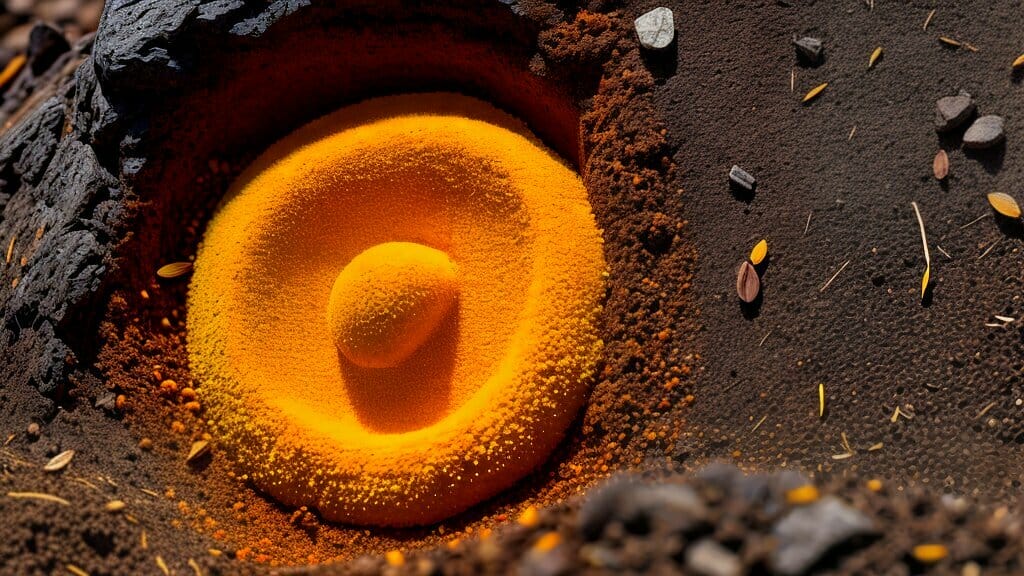Turmeric has been used for centuries as a natural remedy for various ailments, including cancer. In recent years, the anti-cancer properties of turmeric have been extensively studied, and the results have been promising. This comprehensive analysis delves into the benefits of turmeric in cancer prevention and treatment, backed by scientific research.
Turmeric contains a potent antioxidant called curcumin, which has been shown to have anti-cancer properties. Studies have demonstrated its ability to inhibit cancer cell growth and induce cancer cell death, making it a potential alternative or complementary treatment option for cancer patients.
This article will explore the science behind turmeric’s anti-cancer properties, its potential role in cancer prevention and treatment, and the holistic cancer treatment options available at the Cancer Center for Healing in Irvine, CA.
Key Takeaways:
- Turmeric contains curcumin, a powerful antioxidant with anti-cancer properties
- Studies have shown turmeric’s potential in inhibiting cancer cell growth and promoting cancer cell death
- Turmeric may be a potential alternative or complementary treatment option for cancer patients
- The Cancer Center for Healing in Irvine, CA offers holistic cancer treatment options
Understanding Cancer: Causes and Treatment Options
Cancer is a complex disease caused by the uncontrolled growth of abnormal cells. It can occur in any part of the body and can spread to other areas, making it difficult to treat. There are various causes of cancer, including genetic mutations, exposure to carcinogens, and lifestyle factors such as smoking and poor diet.
Traditional treatment options for cancer include surgery, chemotherapy, and radiation therapy. These methods can be effective, but they also come with side effects that can be difficult for patients to manage. Additionally, some cancers may become resistant to traditional treatments, making it necessary to explore alternative options.
“Traditional treatment options for cancer include surgery, chemotherapy, and radiation therapy. These methods can be effective, but they also come with side effects that can be difficult for patients to manage.”
Turmeric and its Anti-Cancer Properties
Turmeric has been widely studied for its anti-cancer properties. The active compound in turmeric, curcumin, has shown promise in preventing and treating cancer.
A study published in the journal Cancer Research found that curcumin can inhibit the growth of cancer cells and even induce cancer cell death in various types of cancer, including breast, colon, and pancreatic cancer. Another study published in the journal Pharmaceutical Research found that curcumin can sensitize cancer cells to chemotherapy and radiation therapy, making these conventional treatments more effective.
Moreover, curcumin has been shown to have anti-inflammatory and antioxidant effects, which can also play a role in cancer prevention. Chronic inflammation and oxidative stress are known risk factors for cancer, and curcumin has been found to reduce both of these factors in numerous studies.
“Curcumin can inhibit the growth of cancer cells and even induce cancer cell death in various types of cancer.”
However, it is important to note that the bioavailability of curcumin is low, meaning that the body doesn’t absorb it well. To overcome this, researchers have investigated different methods of enhancing the absorption of curcumin, such as combining it with black pepper or using liposomal formulations.
In the next section, we will explore the science behind using curcumin for cancer treatment.
Turmeric and Cancer Treatment: The Science Behind It
Turmeric has been found to have potent anti-cancer properties due to its active compound, curcumin. Studies have shown that curcumin can inhibit cancer cell growth and promote cancer cell death, making it a promising candidate for cancer treatment.
Curcumin works by targeting multiple pathways involved in cancer development and progression. It can suppress inflammation, which is a common factor in many types of cancer, and inhibit the activity of enzymes that promote tumor growth. Additionally, curcumin can induce apoptosis, or programmed cell death, in cancer cells, while leaving healthy cells unharmed.
Research has also shown that curcumin may enhance the effectiveness of traditional cancer treatments, such as chemotherapy and radiation therapy, by making cancer cells more susceptible to these therapies and reducing their toxicity to healthy cells.
However, it’s important to note that the bioavailability of curcumin is quite low, meaning that the body cannot absorb it effectively on its own. To overcome this challenge, researchers have developed various methods to enhance curcumin’s bioavailability, such as combining it with other compounds or using specialized delivery systems.
“Curcumin works by targeting multiple pathways involved in cancer development and progression. It can suppress inflammation, which is a common factor in many types of cancer, and inhibit the activity of enzymes that promote tumor growth.”
Turmeric and Cancer Research: Promising Findings
Recent studies have shed light on the potential benefits of turmeric in cancer prevention and treatment. A 2017 study published in the journal Cancer Letters found that curcumin, the active compound in turmeric, can inhibit cancer cell growth and induce cancer cell death in various types of cancer, including colorectal, breast, and pancreatic cancers.
Another study published in the Journal of Clinical Oncology in 2018 investigated the effects of curcumin supplementation on patients with pancreatic cancer and found that it was well-tolerated and potentially effective in slowing the progression of the disease.
Furthermore, a meta-analysis of 19 studies published in the Journal of Cellular Biochemistry in 2018 concluded that curcumin can be a potentially effective therapeutic agent for various types of cancer due to its anti-inflammatory and antioxidant properties.
| Study | Conclusion |
|---|---|
| Cancer Letters (2017) | Curcumin can inhibit cancer cell growth and induce cancer cell death in various types of cancer. |
| Journal of Clinical Oncology (2018) | Curcumin supplementation is well-tolerated and potentially effective in slowing the progression of pancreatic cancer. |
| Journal of Cellular Biochemistry (2018) | Curcumin can be a potentially effective therapeutic agent for various types of cancer due to its anti-inflammatory and antioxidant properties. |
“Curcumin has been extensively studied for its potential in cancer prevention and treatment. The promising findings from recent studies suggest that it may have a role in enhancing cancer therapy and improving patient outcomes.” – Dr. Leigh Erin Connealy MD
Holistic Cancer Treatment at Cancer Center for Healing
The Cancer Center for Healing in Irvine, CA, provides a unique and integrative approach to cancer treatment, combining holistic therapies with conventional medicine. At the center, patients receive personalized cancer treatment plans designed to support their physical, emotional, and spiritual needs. Led by Dr. Leigh Erin Connealy MD, a renowned integrative medical oncologist, the center boasts a team of experienced practitioners who work together to create a comprehensive healing program.
By addressing the root causes of cancer, including stress, inflammation, and toxicity, the Cancer Center for Healing offers a holistic cancer treatment program that complements traditional cancer therapies. Patients receive advanced cancer treatments, including immunotherapy and targeted therapies; integrated with alternative cancer treatments such as acupuncture, nutritional therapy, and spiritual counseling. The center also offers a range of diagnostic services, including state-of-the-art laboratory testing and imaging.
According to Dr. Connealy, turmeric is one of the most promising natural remedies for cancer. In her book, “The Cancer Revolution,” she explores the scientific research behind turmeric’s anti-cancer properties. Curcumin, the active component of turmeric, has been shown to inhibit cancer cell growth and promote cancer cell death in laboratory studies, making it a crucial component of a comprehensive cancer treatment plan.
Cancer Center for Healing’s multidisciplinary approach to cancer treatment provides patients with a supportive and compassionate environment that fosters healing and wellness. By integrating alternative cancer treatments with conventional medicine, patients have access to a full spectrum of cancer therapies that address their unique needs. Patients can book a consultation at the Cancer Center for Healing by calling (949) 680-1880.
Turmeric Supplements for Cancer Prevention
While adding turmeric to your diet may provide some health benefits, individuals who are interested in using turmeric supplements as a form of cancer prevention should proceed with caution.
Ingesting high doses of turmeric may have adverse effects on individuals with certain health conditions, including gallbladder problems, liver disease, and iron deficiency.
It is recommended to consult with a healthcare provider before beginning any turmeric supplementation regimen.
Experts suggest taking a high-quality turmeric supplement with a standardized curcumin content of 95% or greater. The recommended dosage may vary between individuals, but a common range is typically 500-2000 mg per day.
It is also important to purchase turmeric supplements from a reputable source to ensure quality and purity. Look for supplements with third-party certification, such as NSF International or US Pharmacopeia, which can verify the authenticity and safety of the product.
While there is promising research supporting the potential benefits of turmeric in cancer prevention and treatment, it should not be used as a substitute for medical treatment. It is important to consult with a healthcare professional before making any changes to your cancer treatment plan.
Turmeric and Cancer Research: Promising Findings
A growing body of research suggests that turmeric may have anti-cancer properties. In a study published in Cancer Prevention Research, curcumin was found to inhibit the growth and spread of breast cancer cells. Another study published in the Journal of Clinical Oncology found that curcumin supplementation enhanced the effects of chemotherapy in patients with advanced pancreatic cancer.
A clinical trial conducted at The University of Texas MD Anderson Cancer Center showed that patients with pancreatic cancer who received a combination of gemcitabine and curcumin had significantly longer survival rates compared to patients who only received gemcitabine.
These promising findings suggest that turmeric and curcumin may have the potential to complement conventional cancer treatments and improve patient outcomes.
“Curcumin has been shown to improve the effectiveness of chemotherapy and radiation therapy, while also reducing their side effects,” says Dr. Leigh Erin Connealy MD.
However, it’s important to note that more research is needed to fully understand the potential benefits of turmeric in cancer prevention and treatment. As with any alternative treatment, it’s important to consult with a healthcare professional before incorporating turmeric supplements or natural remedies into your cancer therapy regimen.
Turmeric Cancer Therapy: Practical Applications
There are several ways to incorporate turmeric into daily life to maximize its potential benefits in cancer treatment. One of the easiest and most common ways is to add turmeric to meals as a spice. It can be used in a variety of dishes, such as curries, soups, and stews. Additionally, turmeric can be consumed as a tea by steeping a teaspoon of turmeric powder in hot water for several minutes.
For those who prefer a more concentrated form of turmeric, supplementation is an option. It is important to choose a high-quality supplement that contains a standardized amount of curcumin. The recommended daily dose of curcumin is typically between 500-2000 mg.
In addition to supplementation and dietary changes, there are several holistic therapies that can enhance the effectiveness of turmeric in cancer treatment. These include acupuncture, massage therapy, and meditation. These complementary therapies can help reduce stress, boost the immune system, and promote overall well-being.
It is important to discuss any potential changes to your cancer treatment plan with your healthcare provider, including the incorporation of turmeric or any other complementary therapies. Working with a qualified healthcare provider, such as those at the Cancer Center for Healing, can help ensure the safest and most effective approach to holistic cancer treatment.
Expert Opinion: Dr. Leigh Erin Connealy MD’s Perspective
As a renowned integrative oncologist and the medical director at Cancer Center for Healing, Dr. Leigh Erin Connealy MD emphasizes the importance of a holistic approach to cancer treatment. She is a strong believer in the potential benefits of turmeric and its active compound, curcumin.
According to Dr. Connealy, “Curcumin is an extremely powerful anti-inflammatory and antioxidant agent, which can help to prevent cancer and even treat it in some cases. It has been extensively studied and has shown promising results in inhibiting the growth of cancer cells, reducing the risk of metastasis, and enhancing the effectiveness of conventional cancer treatments.”
Dr. Connealy recommends incorporating turmeric into one’s diet by adding it to meals and drinking turmeric tea. However, she also notes the importance of consulting with a healthcare professional before starting any new supplement or treatment regimen.
“Curcumin is an extremely powerful anti-inflammatory and antioxidant agent, which can help to prevent cancer and even treat it in some cases.”
Turmeric and Cancer Treatment: Practical Applications
There are various ways to incorporate turmeric into your daily life, making it a practical and accessible addition to your cancer treatment plan. One easy way to consume turmeric is by adding it to your meals. Consider sprinkling it on roasted vegetables or mixing it into a healthy smoothie. You can also brew turmeric tea or take turmeric supplements.
However, it is important to consult with a healthcare professional before beginning any new supplement regimen. They can help you determine the appropriate dosage and ensure that it does not interact with any other medications you may be taking.
Additionally, it may be helpful to seek guidance from a holistic cancer treatment center like the Cancer Center for Healing in Irvine, CA. Their team of experts can provide personalized recommendations for incorporating turmeric into your treatment plan, as well as other holistic therapies.
The goal of incorporating turmeric into your cancer treatment plan is to support conventional treatments and enhance overall wellness. By combining natural remedies with traditional medicine, you can take a comprehensive approach to healing and increase your chances of successful treatment.
Call 949-680-1880 for Holistic Cancer Treatment Program
If you or a loved one is seeking a comprehensive, personalized cancer treatment program, the Cancer Center for Healing in Irvine, CA, offers a holistic approach to cancer care. Led by Dr. Leigh Erin Connealy MD, their team of experts combines conventional medicine with integrative therapies to address the root causes of cancer and promote healing.
By calling 949-680-1880, you can schedule a consultation with the Cancer Center for Healing and learn more about their holistic cancer treatment program. During your consultation, you will have the opportunity to discuss your unique health concerns and goals, and receive personalized guidance on the most effective therapies for your specific needs.
Don’t wait another day to take control of your health and well-being. Contact the Cancer Center for Healing today to begin your journey towards a comprehensive healing program.
Conclusion
Turmeric, a common spice, has been found to have potential benefits in preventing and treating cancer due to its active compound, curcumin. Scientific research has shown that curcumin can inhibit cancer cell growth and promote cancer cell death. Furthermore, recent studies and clinical trials have investigated the use of turmeric in cancer prevention and treatment, suggesting promising findings and potential future implications.
The Cancer Center for Healing in Irvine, CA, under the guidance of Dr. Leigh Erin Connealy MD, offers an integrative approach to cancer treatment, emphasizing the importance of combining holistic therapies with conventional medicine. Turmeric supplements and natural remedies, along with complementary therapies and lifestyle changes, can enhance the effectiveness of turmeric in cancer treatment.
Expert Opinion: Dr. Leigh Erin Connealy MD’s Perspective
According to Dr. Leigh Erin Connealy MD, turmeric is a powerful anti-inflammatory and antioxidant that has been found to have potential benefits in cancer prevention and treatment. As an integrative practitioner, she emphasizes the importance of individualized treatment plans that incorporate a variety of approaches, including natural remedies and lifestyle changes.
For those seeking holistic cancer treatment, the Cancer Center for Healing offers personalized programs that address the root causes of cancer and provide comprehensive support for physical, emotional, and spiritual healing. To book a consultation or learn more about their holistic cancer treatment program, readers can call 949-680-1880.
Overall, while further research is needed to fully understand the potential benefits of turmeric in cancer prevention and treatment, the evidence thus far suggests that it may be a promising alternative therapy worth exploring.
FAQ
Q: What is turmeric and its benefits in cancer?
A: Turmeric is a spice commonly used in Indian cuisine. It contains a compound called curcumin, which has shown potential benefits in preventing and treating cancer. Some studies suggest that turmeric may help inhibit the growth of cancer cells and reduce inflammation in the body.
Q: What are the causes and treatment options for cancer?
A: Cancer can have various causes, including genetic mutations, environmental factors, and lifestyle choices. Treatment options for cancer typically include surgery, chemotherapy, radiation therapy, and targeted therapies. These treatments aim to remove or destroy cancer cells in the body.
Q: What are the anti-cancer properties of turmeric?
A: Turmeric has been found to possess anti-cancer properties due to its active compound, curcumin. Curcumin has shown potential in inhibiting the growth of cancer cells, reducing tumor size, and inducing cancer cell death. It may also help prevent the spread of cancer cells to other parts of the body.
Q: How does curcumin contribute to cancer treatment?
A: Curcumin, the main component of turmeric, has been studied for its role in cancer treatment. It can target multiple signaling pathways involved in cancer cell growth and survival. Additionally, curcumin has been found to enhance the effectiveness of chemotherapy drugs and reduce their side effects.
Q: What does cancer research say about turmeric?
A: Recent studies and clinical trials have shown promising findings regarding the use of turmeric in cancer prevention and treatment. These studies suggest that turmeric and its components, such as curcumin, may have anti-cancer effects and could be used as complementary therapies alongside conventional cancer treatments.
Q: What is the holistic cancer treatment approach at Cancer Center for Healing?
A: The Cancer Center for Healing in Irvine, CA, follows a holistic approach to cancer treatment. They combine conventional medicine with integrative therapies such as nutrition, mind-body medicine, and detoxification. Dr. Leigh Erin Connealy MD, the medical director, guides patients in creating personalized treatment plans.
Q: Can turmeric supplements help prevent cancer?
A: Turmeric supplements have been suggested as a potential method for cancer prevention. However, it is important to consult with a healthcare professional before starting any supplementation regimen. The recommended dosage and potential risks associated with turmeric supplementation may vary for each individual.
Q: How can turmeric be used as a natural remedy for cancer?
A: Turmeric can be used as a natural remedy to support conventional cancer treatments. Complementary therapies such as acupuncture, massage, and herbal remedies may enhance the effectiveness of turmeric in cancer treatment. Additionally, lifestyle changes such as adopting a healthy diet and managing stress can contribute to overall well-being.
Q: What are the practical applications of turmeric in cancer therapy?
A: Turmeric can be incorporated into daily life in various ways. It can be used as a spice in cooking, added to smoothies, or taken in supplement form. However, it is important to note that individual responses to turmeric may vary, and it is advisable to consult with a healthcare professional before making any significant changes.
Q: What is Dr. Leigh Erin Connealy MD’s perspective on turmeric and cancer?
A: Dr. Leigh Erin Connealy MD, the medical director at the Cancer Center for Healing, recognizes the potential benefits of turmeric in cancer prevention and treatment. She emphasizes the importance of a comprehensive and personalized approach to cancer care, combining conventional and holistic therapies for optimal outcomes.
Q: How can I book a consultation at Cancer Center for Healing?
A: To book a consultation at the Cancer Center for Healing, please visit their website or contact their office for more information. Their team will assist you in scheduling an appointment and provide guidance on the next steps towards a holistic cancer treatment program.
Q: How can I enroll in a holistic cancer treatment program?
A: If you are interested in a holistic cancer treatment program, you can call the Cancer Center for Healing at 949-680-1880. Their experienced team will provide you with the necessary information and guide you through the enrollment process to start your comprehensive healing program.
Q: What is the potential of turmeric as an alternative cancer treatment?
A: Turmeric shows promise as an alternative cancer treatment due to its potential anti-cancer properties. While more research is needed to fully understand its effectiveness, turmeric, especially its active compound curcumin, has demonstrated potential benefits in preventing and treating cancer. Consulting with a healthcare professional is advised for personalized treatment recommendations.


















